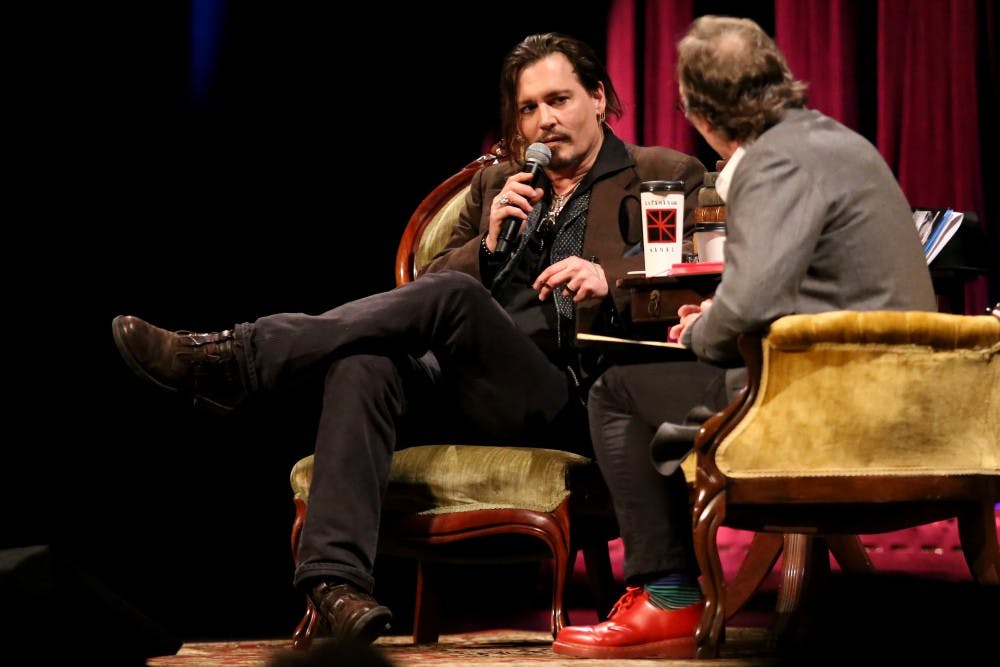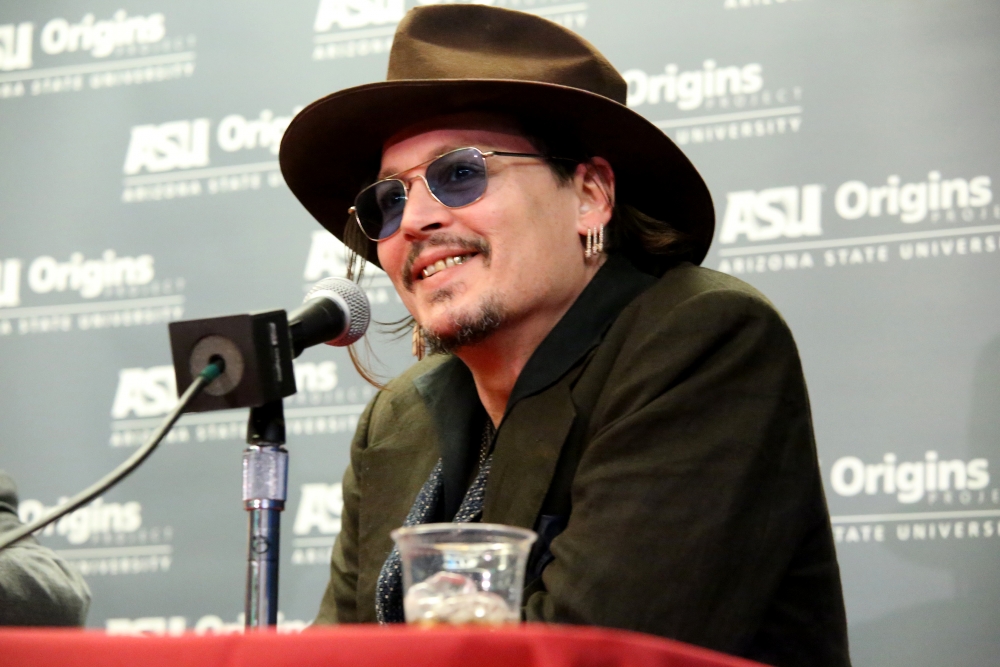ASU Origins Project director Lawrence Krauss sat down with actor Johnny Depp on Saturday for a dialogue entitled “Finding the Creativity in Madness.” While the talk was upbeat and amusing, it also involved a great deal of sincerity.
Depp shared how many of his outlandish ideas come to him and explained that his life wasn’t always glamourous.
“What I hope if anybody does have that — for lack of a better term — thing inside them that they find an outlet for it," Depp said. "Because there’s madness, there’s crazy, there’s insanity, there’s delirium... I hope that people will — if they have that tendency — that they can find a way to embrace it and use it in a creative sense. Use that to find your way, to be able to stand on solid ground.”
If you didn't attend, don't worry we got you covered with five takeaways from Depp's dialogue with Krauss.
Don’t be normal. Be you. Just Be.
Depp said he always found people who tried to fit in to be boring and monotonous.
His unorthodox methods of developing complex characters is what makes him stand out from other actors. Depp said he never read the screen directions because he didn’t want to know what “they” wanted him to do. He wanted to make the characters his own.
Depp emphasized how important he felt it was to not allow yourself to be told who you are or where you belong. During his time on the series 21 Jump Street, Depp said he felt imprisoned and like he had become a product of television, so he tried everything he could to get fired.
He pled insanity to some extent and told his producer that the shenanigans were merely his “vision for the character.” Young Depp’s schemes ranged from wearing a George Washington wig to putting a rubber band on his tongue to create a speech impediment. Neither act freed him.
“Think of yourself as a chest of drawers,” Depp said. “They’re all in there and they’re all accessible. That’s not healthy.”
Depp pulled out a cigarette and began to smoke, demonstrating his tendency to do what makes him happy. Krauss responded with “I only like it because it’s breaking the rules.”
Overall Depp said the reason why he feels it’s so important to stay true to himself and his characters is that if he doesn’t it’s an injustice to the audience.
“If it’s not your truth it’s bulls--t and the audience can sense it,” he said.
Remain humble
Depp said he became an actor by accident, at first just doing it to pay rent.
“I started doing these films because someone was going to give me money,” Depp said half joking. He added that he still isn’t sure if he ever made the decision to become an actor.
Depp’s humility shined through in his discussion with Krauss as he averted his eyes whenever a clip from one of his films was played. He said he doesn’t care about how successful his films are in the box office, he avoids seeing his films at all costs. Depp reminisced about one time when he was forced to watch one of his films and fell asleep 35 times.
Depp said he believes ambition is a dirty word because it feels like you’re working for some gain or status.
Build on your adversity
During a Q & A session with media before the presentation, Depp talked about how his home life growing up wasn’t, well on the level of "Leave it to Beaver", and he never felt like he had a sense of security.
“I had to find ways to escape and I think that there was a point in my mid-teens where I realized that there was something abnormal in me or of me,” Depp said. “But at a certain point you’ve got one foot in the circle and one foot out of the circle of madness and reality. At a certain point (I started) embracing the very thing that I had no idea where it was going to lead me.”
To cope with the thoughts flooding his brain or as Depp put it “avoiding the circus” he tried to cram as much knowledge and information as he could into his brain.
In fact, Depp struggled with this so much that he added an unscripted line to a scene in "Alice in Wonderland" where the Mad Hatter points to his head and says, “I don’t like it in here. It’s too crowded.”
Depp said he even read a psychology book to try and diagnose himself and realized he was “screwed.”
Don’t overlook the small things in life
Throughout Depp’s dialogue with Krauss he continued to point out how the smallest things he noticed helped him create incredibly successful characters.
After Krauss played a clip from "Pirates of the Caribbean" where Jack Sparrow is seen talking to himself, Depp talked about his love for the scene where he said “my peanut.”
He said he loved how something huge is taking place around his character, but this small, insignificant little peanut becomes everything.
A number of Depp’s characters are successful because of their unique ticks and traits. These small tweaks come from real people Depp has observed throughout his life. For example, one of his children’s tutors was the inspiration for the way the Mad Hatter speaks with his eyes closed. Depp even said his inspiration for Edward Scissorhand’s innocence and unconditional love came from a dog he owned at the time.
Learn to laugh
Walking into his Q & A with media on Saturday, Depp’s first words were “Hello, I’m Lawrence Krauss. I’m a professor here at ASU.”
Depp made the audience laugh throughout the night with funny stories and jokes about his flaws.
Many of his popular characters came to fruition as a result of his tendency to throw caution to the wind. While filming Edward Scissorhands, Depp said he took two hits of ecstasy, strapped on his scissor hands and attempted to make coffee.
Depp also stressed the importance of not allowing unimportant daily troubles, like if “the car won’t start or the cat drops dead," to get to you.
He added that if people worry too much about the past and future then “now doesn’t exist.”
Reach the reporter at bridget.dowd@asu.edu or follow @bridgetbernice on Twitter.
Like The State Press on Facebook and follow @statepress on Twitter.





